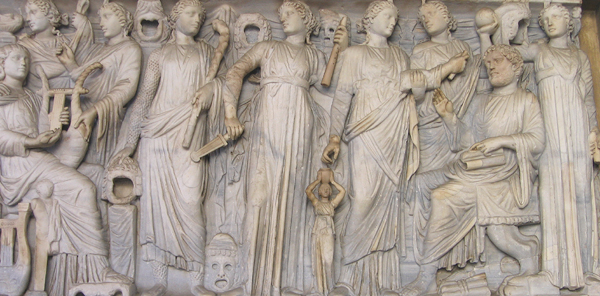
GREEK TRAGEDY
| Dr. Ann R. Raia, Professor of Classics Office Hours: M 1-2, F 9-10 & by appointment |
Office: Castle 325 Phone: (914) 654-5398 Faculty Home page |

SYLLABUS
Spring 2008
Description: Exploration of the unique nature and continuing significance of Greek tragedy and Greek theater in the drama of Aeschylus, Sophocles, and Euripides, with particular emphasis on the portrayal of women in 5th century Greece. Through close reading of the plays and literary criticism, as well as discussion, writing, research, and performance, students will come to an understanding of the impact of this dramatic form on the civilization which created it and of its survival in contemporary Western culture.
Course Objectives and Student Learning Outcomes: at the conclusion of this seminar you will be able to --
Requirements and Outcomes Assessment: you are expected to --
Materials of Instruction:
Course
Texts: (please purchase these editions):
Ley, Graham, A Short Introduction to the Ancient Greek Theater.
Chicago: U Chicago Press (pb)
Aeschylus: The
Complete Greek Tragedies: Aeschylus I. Edited by David Grene and Richmond
Lattimore. Chicago: U Chicago Press (pb)
Sophocles: The Theban Plays. Translated by Peter Meineck, Paul
Woodruff. Indianapolis: Hackett (pb).
Euripides: The Complete Greek Tragedies: Euripides I (Alcestis, Medea,
Heracleidae, Hippolytus). Edited by David Grene and Richmond Lattimore.
Chicago: U Chicago Press (pb)
Euripides: The
Complete Greek Tragedies: Euripides V (Electra, Phoenician Women, Bacchae).
Edited by David Grene and Richmond Lattimore. Chicago: U Chicago Press (pb)
Bibliographies of selected books on the ancient theater, performance, literary criticism, the three tragedians (Aeschylus, Sophocles, Euripides, Theater Production).
Additional readings, including articles, guides, outlines on Angel or on library reserve.
Visual aids, including slides, prints, and videotaped performances of plays
Internet resources on the classical world, such as Diotima, Perseus, VRoma will be hot-linked on Angel together with weekly assignments.
Methods of Instruction:
Grading: your final grade will be based
on the quality of your work according to the percentages below.
Students
found cheating or plagiarizing will fail the course, as will those who do not
complete all course requirements.
More than one unexcused absence will
result in a lowered final grade.
| Class participation | 40% |
| Journal Project | 10% |
| Seminar Project | 25% |
| Performance Project | 25% |
Course Policies:
You are expected to
make every effort to be present, arrive on time, and be prepared to participate
actively in all of the seminar activities. Behavior appropriate to the learning
goals is mandatory. Students with more than 1 un-excused absence and those who
regularly arrive late will find their grade lowered one level for each
additional absence/lateness. Since assignments are given in preparation for
class discussion, late writing assignments will not be accepted (arrangements
will be made only for students with excused absences, such as a doctor's note
or an excuse from the Dean). Students who are absent or late are responsible
for obtaining assignments, notes, and materials from
Angel,
fellow students or the professor during office hours. Students with documented
special needs must inform the professor at the beginning of the course of
accommodations or services they require for successful academic participation.
Schedule of Topics
We will meet on Fridays, 1l a.m. - 1 p.m., in the
Honors Center (Castle 323) unless otherwise announced.
Detailed assignments
will be given at the end of each class and posted on
Angel,
along with reading/writing questions and hyper-linked Internet
materials.
January 25: Introduction to the course content and each other; development and acceptance of the syllabus and requirements.
February 1 : Reading of Aeschylus' trilogy Oresteia: Agamemnon: look for details, guides, and visuals on Angel
February 8: Aeschylus' trilogy Oresteia: Libation-Bearers (Choephoroi): look for instructions and materials on Angell
February 15: Aeschylus' trilogy Oresteia: Furies (Eumenides): look for instructions and materials on Angel
February 29: Aristotle's Poetics, Ley's A Short Introduction to the Ancient Greek Theater: look for instructions and materials on Angel
March 7 : Sophocles' Oedipus Tyrannos: look for instructions and materials on Angel
March 14 : Sophocles' Oedipus at Colonos: look for instructions and materials on Angel
March 28: Sophocles' Antigone: look for instructions and materials on Angel
April 4: Euripides' Medea: Kathy and Alex
April 11: Euripides' Electra: Mary and Darianna
April 18: Meeting for final arrangements and rehearsal for Performance
May 2: Euripides' Hippolytos: Sarah and Ashley
May 9: Euripides' Bacchae: Erin and Katherine
Concluding Discussions, evaluation of seminar
May 12-16: Finals Week: Senior Grades due Wednesday, May 14